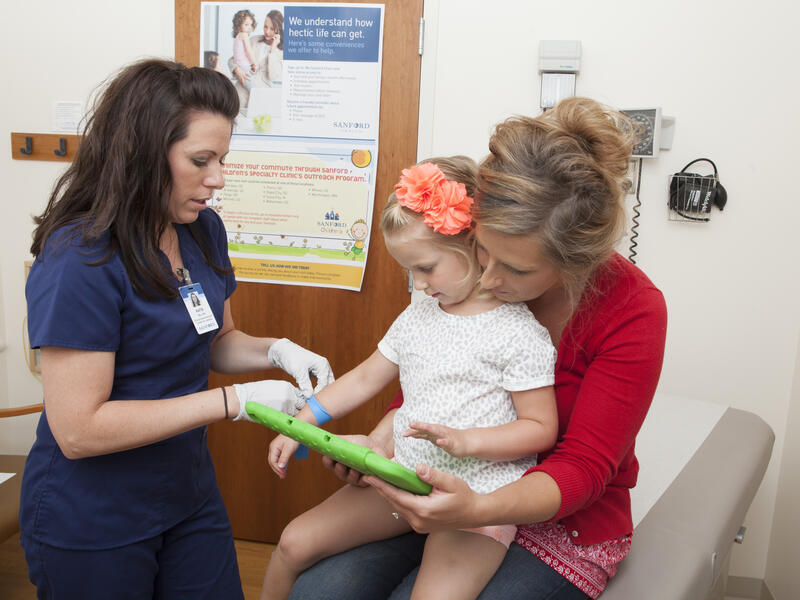A few months into maternity leave, Britta Kockelman, RN, is cherishing moments at home with her newborn son Ezra in Fargo, North Dakota. The Sanford nurse will be returning to her patients in the intermediate care unit soon.
Kockelman says the unit is a “good place to be to get experience in a little bit of everything” when it comes to health care.
A recent North Dakota State nursing school graduate, Kockelman adds completing Sanford Health’s Nurse Residency Program is making her feel confident and supported in her new career.
“(It was) just a safe place to come and share your thoughts and your feelings,” Kockelman said about the 12-month, evidence-based program for new Sanford nurses. “Suddenly you realize, I’m not the only person who feels like this right now as a new grad nurse.”
Explore nursing careers: Nursing jobs at Sanford Health and Good Samaritan Society
While monthly seminars for a year didn’t sound exciting at first, she says the topics and strategies taught were meaningful. So were the relationships built with others.
“I usually left feeling like, ‘Oh that was good, uplifting conversation.’ I felt validated and I felt like my career and my life benefitted from those four hours of conversation and group activities we’d go through,” Kockelman said.
‘It’s all of Sanford nursing that’s your team’
The residency got its start in 2019 just before the COVID-19 pandemic hit. It’s meant to be a bridge between nursing school and practice.
One of the program’s coordinators from the beginning, Sarah Duncan often shares this experience with her learners in Bemidji, Minnesota.
“When I first started my job, everything was new and exciting. I felt energized to come every day,” Duncan, an RN clinical educator and former surgical nurse, said. “About three months in, I started to really question, ‘Gosh, I feel like I’m not learning as fast as I should and maybe I shouldn’t have made this choice and maybe they shouldn’t have hired me.’
“If I talk about that story, I can see the look of shock on the faces on these new grad nurses because I’m basically telling them a lot of what they’re feeling three months into their job.”
The goal for each nurse resident is to develop confidence in providing quality care to patients, learn leadership skills and grow professional relationships. Registered nurses with less than 12 months of experience, at participating facilities, are automatically enrolled in the program.
“Their nursing career is very much interconnected and tied to those professionals around them and to the whole network and organization of Sanford. It gives a sense of unity to our practice and our experience,” Duncan said.
Gathering with peers from different departments, the residency is bringing caregivers from a variety of disciplines together.
“It’s not just your friends or just your department that’s your team, it’s all of Sanford nursing that’s your team. That’s something we want to drive towards,” Duncan said.
“I love the connection that it drives. I love the sense of fabric that we are weaving within our nursing practice.”
Residency program ‘does set us apart’
Prospective employees are looking for this level of teamwork according to Katie Meeker, program facilitator and Sanford RN clinical educator in Sioux Falls, South Dakota.
“Not every organization in the United States provides a residency program. It does set us apart. New hire nurses look to that to see, ‘Do they have something that can help support me?’” Meeker said.
This guidance didn’t exist when Meeker started in pediatric nursing in 2003. She loves sharing what she’s learned over the years from best practices to tools that help nurses deal with cognitive shift.
“(That’s when) you’re shifting what you’re currently doing to focus on something else. It is crazy the amount that we are actually shifted in nursing,” Meeker said.
A more prepared, professional nurse leads to quality care for patients.
Duncan adds, “There’s no other higher calling than just making sure that every patient that comes through our doors receives the best, most safe care they can receive. The biggest part for me, is the most engaged care they can receive. They need to feel the presence of that professional that’s caring for them.”
Safety is paramount. Nurses empowered to speak up for safety lead to better outcomes.
“I feel like I have the voice and the confidence to report those things,” Kockelman said. “I’m speaking up for an environment of safety for our unit and for our patients.”
‘Help should be asked for and offered generously’
Creating that space where nurses can care for others while caring for themselves is also key.
“We want these new grad nurses to enter into their practice seeing well-being and self-care like we see hand hygiene. It’s an every time event. You have to make sure it happens,” Duncan said.
“This is a place in which help should be asked for and offered generously.”
Not only is it the right way to operate, but also these educators say it helps recruit and retain nurses.
“Hopefully we continue to retain or even grow our nurses so that they have opportunities for professional growth. We love that. We love to see that,” Meeker said.
Learn more
- Sanford Health recruits veterans to nursing field
- Medical center and clinics achieve 5th Magnet recognition
- Medical museum reopens to share history of nursing
…
Posted In Company News, Nursing and Nursing Support, People & Culture, Postgraduate Programs
